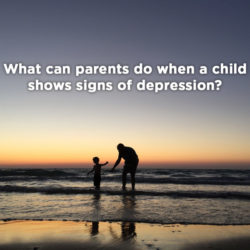Photo by Joseph Chan on Unsplash
The teenage years are a time of transition. Doubt begins to creep into the psyche of teenagers as they begin to question all the truths they have learned as children. Insecurity settles into their hearts and they begin to wonder who they are and what can bring them fulfillment. Teenagers’ perspectives can either begin to narrow or widen during this time, depending in part on how they are shepherded in this tumultuous period in their lives.
To be able to navigate through all this, they need truth to accompany them as they make decisions, to guide their behavior, and set them up for future success. In this particular stage of their lives, I believe teenagers will benefit from a close and intimate relationship with their parents, especially when this gives them access to wise and godly parental advice.
Here are three relational myths I believe parents can help dispel in their teenager’s lives, and what to teach them instead:
Myth #1: “A boyfriend/girlfriend will complete me.” To be honest, we probably all felt this way at a certain point in time; but it just isn’t true. It’s a lie popularized by a century of misleading romance films and pop culture. Our teenagers gobble up this well-served lie on the tray of HBO, Netflix, and You-Name-It. A wise friend once said to me, “Movies often show getting together as the happy ending, but it’s actually the beginning of a lot of work.” Every couple on earth can support this. Relationships don’t fix our issues, they reveal them.
The Bible speaks of every person’s thirst (Isa. 55:1-3), and it is truly a longing to be loved. God’s invitation to us in that passage shows us that truly, no one else can fill that longing aside from the God of everlasting love. If teens use a boyfriend or girlfriend to try and fill that emptiness, they’ll be disappointed to learn that their partners are just as needy as they are! Only when our hearts are satisfied in God’s love can we truly be free to love someone else.
Lead your teens to find that satisfaction in God first. And when they feel drawn to opposite-sex relationships, let them see how relationships are all about hard work. It’s about seeking the good of another. It’s about being selfless while battling with our own selfishness every day. Take the chance to tell them about honest challenges that couples face and open their eyes to a realistic view of relationships.
Myth #2: “He/She is ‘The One’.” One can’t help but laugh at how much we bought into this lie. I’ll be honest and call out the real perpetrators of this lie – Disney. Look at Prince Charming and Snow White. They knew nothing about each other! They met when she was literally in a coffin. It’s messed up. This teaches young people to value a temporary surge of emotions when meeting someone attractive and call it “true love” –when in fact it’s only infatuation.
Bad things happen when teenagers decide to pursue someone based on feelings alone. I learned this lesson the hard way. Infatuation doesn’t last, and soon you’ll be chasing the feeling, jumping from relationship to relation-shopping.
In contrast with culture, God provides sound wisdom as He urges us to grow in good character, love, faith, and joy, and then to seek those traits (not a feeling) in a possible mate as well. Teach your teenager to discern when infatuation kicks in and conduct themselves wisely through it.
Myth #3: “We won’t go too far.” First of all, I’m all against communicating distrust to family members whether in word or deed. Teenagers (or anyone) react negatively to feeling distrust from their parents and only pushes them towards the very attitudes we dislike.
But there are great rewards in teaching teenagers healthy boundaries and how to keep them. One lesson that stuck to me was to think of my relational boundaries as a cliff, and to be safe, you’ll go nowhere near it. My seminary professor gave this advice when handling relational boundaries: “Imagine her father watching you with a gun. Would he be happy with what you’re doing? If not, then better not do it.” Teach them to not even come close that boundary!
Teach them the law of diminishing returns. Humans are naturally drawn to stuff that thrill and excite. At first, holding hands is exciting; after a while, it’s not. Next, hugging is a thrill; but after a while, it isn’t — and so on and so forth. This path leads to a terrible end: once purity is lost, it can’t be regained.
Teach your young men to protect women, especially from themselves, and teach your young women how to protect their honor. This may be one of the best practical advice you can ever give your teenager.
Be creative in the way you teach. They’re already sitting down listening to an adult dish out knowledge five days a week, so spice things up with how you plan to teach them more truths. Make it fun and active, or quiet and sincere. It’s up to you.
A final piece of advice: You don’t need to do it alone! This is where a good community like church can come in to help. Find a place where they can connect with peers and other adults who can be a good influence in their lives.

Jorin Luke R. Caipang is the Student Ministry Director at Saddleback South Manila. He describes himself as “a 6-foot stick of fun, games, and God’s love (at least I try to be)”.
Related Posts
-
What Parents Need to Know About Depression
Why does depression seem more commonplace these days? Dr. Lillian Ng Gui, psychologist and Christian…
-
What Can Parents Do When A Child Shows Signs of Depression?
What can parents do when a child shows signs of depression? Are there ways to…
-
Parenting Fallacies
Fallacies are mistaken beliefs or false notions based on unsound arguments and therefore are deceptive…





Very helpful article. Thank you for writing it.